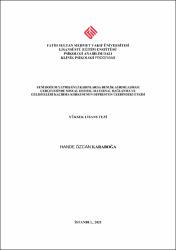| dc.contributor.advisor | Saltukoğlu, Gaye | |
| dc.contributor.author | Karaboğa, Hande Özcan | |
| dc.date.accessioned | 2021-08-19T16:05:20Z | |
| dc.date.available | 2021-08-19T16:05:20Z | |
| dc.date.issued | 2021 | en_US |
| dc.identifier.citation | KARABOĞA, Hande Özcan, Yeni Doğum Yapmış Evli Kadınlarda Benlik Ayrımlaşması Çerçevesinde Sosyal Destek, Maternal Bağlanma ve Gelişmeleri Kaçırma Korkusunun Depresyon Üzerindeki Etkisi, Fatih Sultan Mehmet Vakıf Üniversitesi Lisansüstü Eğitim Enstitüsü Psikoloji Anabilim Dalı Klinik Psikoloji Programı,Yayımlanmamış Yüksek Lisans Tezi, İstanbul 2021. | en_US |
| dc.identifier.uri | https://hdl.handle.net/11352/3847 | |
| dc.description.abstract | Bu çalışmanın amacı, son 13 ay içinde doğum yapmış kadınların benliğin ayrımlaşması ve alt boyutları düzeylerine göre eşten, aileden ve arkadaştan alınan sosyal destek, gelişmeleri kaçırma korkusu ve maternal bağlanma puanlarının depresyon puanlarının yordayıcısı olup olmadığının incelenmesidir. Bu değişkenler, Eş Desteği Ölçeği, Aile Desteği Algılama Ölçeği, Arkadaş Desteği Algılama Ölçeği, Gelişmeleri Kaçırma Korkusu Ölçeği, Maternal Bağlanma Ölçeği ve Benliğin Ayrımlaşması Ölçeği ile elde edilmiştir. 410 katılımcı ile yürütülen araştırmada tahminler Çoklu Doğrusal Regresyon modelleri yardımıyla elde edilmiştir. Her bir düzeyde, depresyon puanını açıklayan değişkenlerin farklılaştığı görülmüştür.Analiz sonucuna göre ben-diğerleri ve duygu-düşünce dengesinin kurulabildiğine işaret eden yüksek düzeyde benlik ayrımlaşması veya düşük düzeyde başkalarına bağımlılık gösteren katılımcıların depresyon puanlarının sosyal destek puanları ile açıklandığı; benlik ayrımlaşma düzeyi azaltıkça veya başkalarına bağımlılık düzeyi artıkça bu dengenin bozulduğu ve sosyal destekten elde edilen faydanın azaldığı görülmüştür. Benzer şekilde, duygusal kopma düzeyi artıkça sosyal destekten faydalanmanın azalması dikkat çekmiştir. Benlik ayrımlaşması, duygusal tepkisellik, duygusal kopma, başkalarına bağımlılık düzeyi azaldıkça ve ben pozisyonu düzeyi artıkça maternal bağlanmadaki artışın depresyon puanındaki azalmayı açıkladığı görülmüştür. Gelişmeleri Kaçırma Korkusu ile depresyonun yordandığı başkalarına bağımlılık, duygusal kopma ve ben pozisyonu düzeyi yüksek olan kişiler için Gelişmeleri Kaçırma Korkusu ile Depresyon düzeyi arasında pozitif yönde ilişki olduğu görülmüştür. | en_US |
| dc.description.abstract | The aim of this study is to examine whether social support from spouse, family and friends, fear of missing out, and maternal attachment scores are predictors of depression scores in women who have given birth in the last 13 months. These variables were obtained with the Spousal Support Scale, Perceived Social Support from Family, Perceived Social Support from Friend, Fear of Missing Out Scale, Maternal Attachment Scale, and Differentiation of Self Scale. In the study conducted with 410 participants, the predictions were obtained with the help of Multiple Linear Regression models. It was observed that the variables explaining the depression score differed at each level. According to the results of the analysis, the depression scores of the participants with a high level of differentiation of self or low level of fusion with others, which indicates that the balance of self-others and emotion-thoughts can be established, is explained by the social support scores. It has been observed that as the level of differentiation of self decreases or the level of fusion with others increases, this balance is disrupted and the benefit obtained from social support decreases. Similarly, as the level of emotional cutoff increased, the decrease in benefiting from social support was noted. It was observed that as the level of differentiation of self, emotional reactivity, emotional cutoff, fusion with others decreased and the level of I position increased, the increase in maternal attachment explained the decrease in the depression score. It has been observed that there is a positive correlation between the Fear of Missing Out and the level of Depression, for people with high levels of fusion with others, emotional cutoff and high I position, for whom depression is predicted. | en_US |
| dc.language.iso | tur | en_US |
| dc.publisher | Fatih Sultan Mehmet Vakıf Üniversitesi, Lisansüstü Eğitim Enstitüsü | en_US |
| dc.rights | info:eu-repo/semantics/openAccess | en_US |
| dc.subject | Benlik Ayrımlaşması | en_US |
| dc.subject | Sosyal Destek | en_US |
| dc.subject | Maternal Bağlanma | en_US |
| dc.subject | Gelişmeleri Kaçırma Korkusu | en_US |
| dc.subject | Doğum Sonrası Depresyon | en_US |
| dc.subject | Differentiation of Self | en_US |
| dc.subject | Social Support | en_US |
| dc.subject | Maternal Attachment | en_US |
| dc.subject | Fear of Missing Out | en_US |
| dc.subject | Postpartum Depression | en_US |
| dc.title | Yeni Doğum Yapmış Evli Kadınlarda Benlik Ayrımlaşması Çerçevesinde Sosyal Destek, Maternal Bağlanma ve Gelişmeleri Kaçırma Korkusunun Depresyon Üzerindeki Etkisi | en_US |
| dc.title.alternative | The Effect of Social Support, Maternal Attachment and Fear of Missing Out on Depression of Postpartum Married Women Within The Framework of Differentiation of Self | en_US |
| dc.type | masterThesis | en_US |
| dc.contributor.department | FSM Vakıf Üniversitesi, Lisansüstü Eğitim Enstitüsü, Psikoloji Ana Bilim Dalı | en_US |
| dc.relation.publicationcategory | Tez | en_US |
| dc.contributor.institutionauthor | Karaboğa, Hande Özcan | |



















